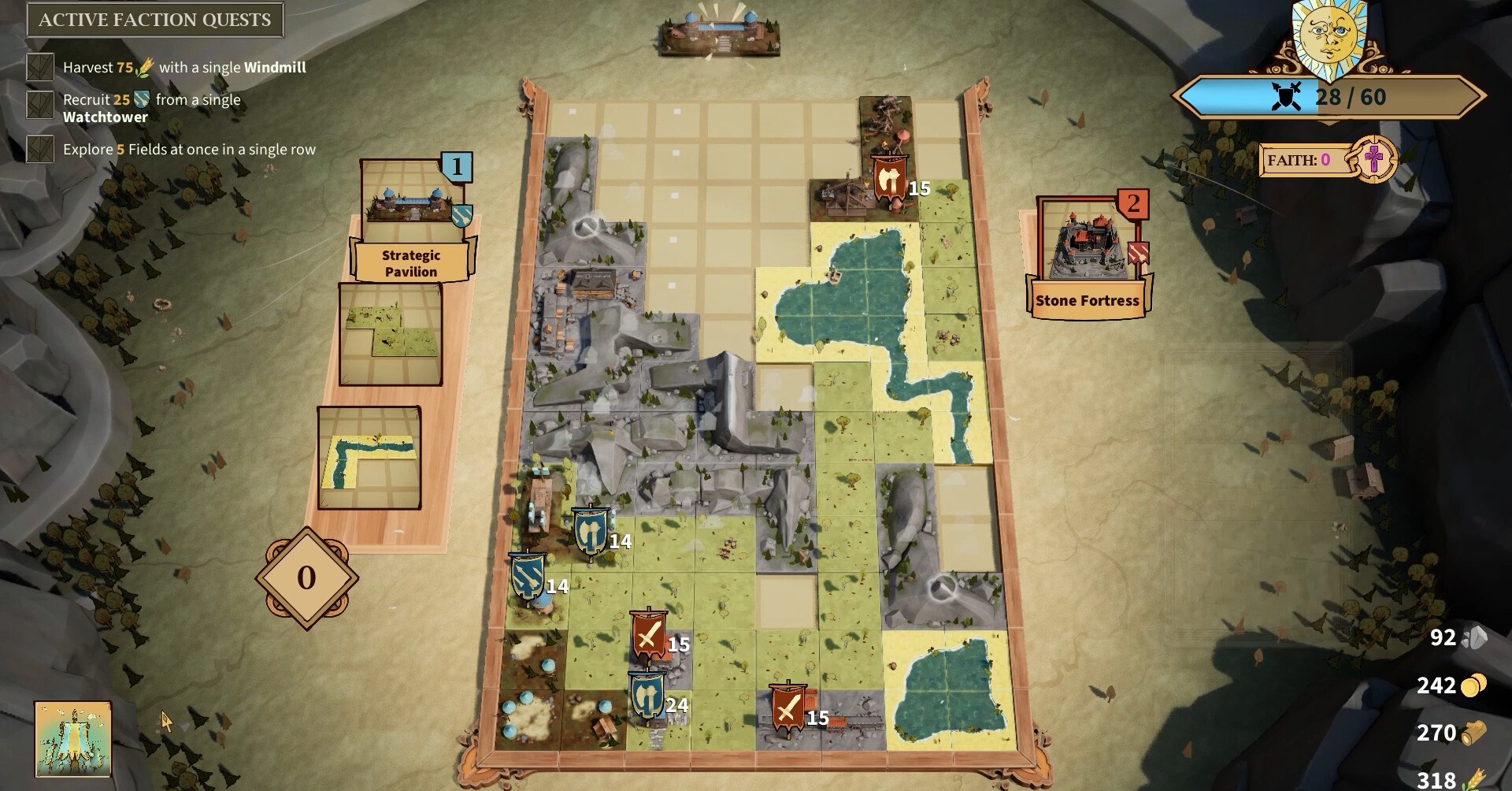Drop Duchy looks a bit like Tetris at first glance — an L-shaped forest tile drops into the bottom left corner while a straight tile of mountains sits horizontally next to it. When the line fills up, trumpets resound and resources drop into your reserves. That’s when the game starts to feel more like a mini board game, where you strategically place randomly drawn tiles to optimize things like resources and military strategy. At the end of that resource-gathering round, it changes shape again — you’ll add new tiles to your deck and prepare a load-out for battles in a fashion not unlike Dicey Dungeons or Balatro.
As clear as these comparisons are, Sleepy Mill Studio’s new board-building game synthesizes all those satisfying game mechanics into something new, singular, challenging, and replayable. I could list five more games that remind me of Drop Duchy — but it’s probably better you just dive in, because really, it’s just Drop Duchy.
As for the game’s true inspirations, game director and Sleepy Mill founder Jean-Baptise Oger told Polygon that board games like Carcassonne and Cartographers were early muses. Then he came across Dorfromantik and a subsequently discovered a bunch of other board game-inspired indies on Steam.
“I’m a big, big board game player,” Oger told me over a Zoom call, pointing to his some-400 collection. Drop Duchy has that tactile tension, where you have to make tile placements while keeping in mind what’s left in the pile. And in this game, you don’t just place your own tiles — you’ll place enemy tiles, too. There are tons of variables to keep the game interesting, but Sleepy Mill didn’t stuff the game with too many details too quickly.

Part of that is indeed due to Oger’s strategic choices to use recognizable elements, like the Tetris-y nature of the game, and getting players invested right away with zippy controls — both boons for games new to market.
And I can confirm, the quick controls and gradual learning curve make it easy to get pulled into Drop Duchy fast and hard. That’s in large part due to the roguelite elements, where the stakes ramp up with each round and your load-out improves as you earn better and better cards to add to your deck.
“We did try, and you’ll see as you progress, to make the beginning of the game more cozy and warm,” Oger said. “But as you progress, there’s more darkness, dark enemies that come up.”
There’s one element of Drop Duchy that might deter some folks: There is math!
“I’ve had some internal debates and try to come up with good answers to people who ask for automatic maths or automatic calculations. I feel like it’s an element of the tension of the game, that you’re not quite sure,” Oger said. “In Balatro, you could in theory use a calculator to make sure you’re really hitting that threshold. But just like in Balatro I didn’t feel the need to include it in the game, maybe because the combat in Drop Duchy is only additive — only plusses and minuses.”
Each type of military troop has a slight advantage over another, so to do the math exactly, you’d be multiplying lots of fractions. Oger said this is intentional — you can make guesstimates, but ultimately a bit of shoddy math likely won’t make or break your run.
“Even if you lose because you failed at math, you wouldn’t have progressed further anyway,” he said. But he’s heard from some players with dyscalculia, a learning disability that makes it difficult to differentiate numbers and equations, and might add an auto-calculate mode so those folks can enjoy the game.
“Roguelites can be very deep, but they start slow and you learn at your own pace. You can experiment, you can try again,” he said. “I think that’s one of the big reasons a roguelite is just awesome for this — to teach new systems to play, progressively.”
The post Drop Duchy looks like Tetris, feels like Dicey Dungeons, and pulls you in like Balatro appeared first on Polygon.




